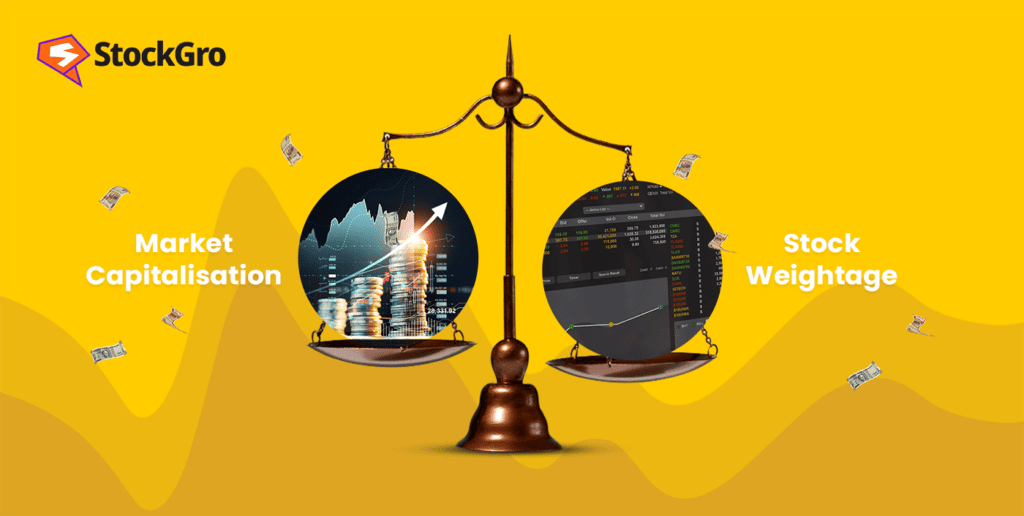
Stock weighting is a significant factor in every stock market index. For instance, the BSE Sensex has 30 equities in India, but the Nifty contains 50 business entities. By free-float market capitalisation, both indexes are weighted. Consequently, equities that are not controlled by promoters are used to determine the weighting.
It might help your investing plan determine the weights of the equities you own. When assessing the trajectory and performance of the Nifty 50 index, Nifty weightage may be a significant factor.
This blog post will cover the definition of stock weightage, the importance of Nifty weightage, the list of Nifty 50 bank stocks, and how it may influence an investor’s decision.
What is stock weightage?
The relative weight of a certain stock inside an index is known as its stock weightage. One can calculate it by dividing the stock’s market capitalisation by the sum of the market capitalisations of all the stocks in the index.
To put it in an equation,
Stock weightage = Market capitalisation of the stock / Total market capitalisation of the index
An index’s weighting of stocks is significant since it dictates how much a stock’s price fluctuations will affect the index. A highly weighted stock will influence the index more significantly than a business with a lesser weight.
The index’s largest weight will be allocated to the business with the biggest free-float market capitalisation. One of the most used techniques for weighing index elements is this one.
Even if dozens of alternatively-weighted indexes have been created recently, market-cap-weighted indices based on free float continue to be the industry standard primarily because index traders prioritise liquidity above everything else. The free-float market cap weighting approach, out of all the approaches, deals with the matter of the stock’s worth and liquidity.
Also read: Stock Market 2022 Wrap: Highlights
Different types of weighted indexes
There are primarily three types of weighted indexes available in the stock market.
- Price-weighted index
A stock’s weight in a price-weighted index is based on its price. This indicates that a stock’s weight in the index increases with its price. For instance, the Nifty Bank stock weightage is determined using a free-float market capitalisation-based technique, just like any other index.
- Capitalisation-weighted index
The entire value of a company’s shares that are traded on the market is known as its market capitalisation. A capitalisation-weighted index is a stock market index that determines the weight to be assigned to each firm based on its market capitalisation. This indicates that larger businesses have a greater impact on the index than smaller ones.
- Unweighted index
Securities with the same weight inside the index make up an unweighted index. Every index component has a corresponding monetary amount invested in it. The performance of one stock in an unweighted stock index won’t significantly impact the index’s overall performance. Unlike weighted indexes, which assign a certain percentage weight to a subset of companies based on market capitalisation, this approach is not applicable to all equities.
How to calculate the weightage of stocks in Nifty?
The obvious challenge is determining how these stocks comprise the index weights. How did we determine that ICICI Bank should weigh 7.87% and ITC should weigh 4.55%?
While there are other approaches to weighing stocks, the National Stock Exchange employs the internationally recognised and benchmarked “free-float market-capitalisation” weighting technique. According to the company’s free-float market capitalisation, weights are allocated; the greater the market capitalisation, the larger the weight.
Let’s understand Nifty IT comprising four stocks weightage with the following free-float market capitalisation technique:
IT A: ₹ 40,000 crores
IT B: ₹ 25,000 crores
IT C: ₹ 20,000 crores
IT D: ₹ 15,000 crores
Total free-float market capitalisation of Nifty IT = (₹ 40,000 crore + ₹ 25,000 crore + ₹ 20,000 crore + ₹ 15,000 crore) = ₹ 100,000 crore
Now, to calculate the weightage of each stock:
IT A weightage = (₹ 40,000 crore / ₹ 100,000 crores) * 100 = 40%
IT B weightage = (₹ 25,000 crore / ₹ 100,000 crore) * 100 = 25%
IT C weightage = (₹ 20,000 crore / ₹ 100,000 crore) * 100 = 20%
IT D weightage = (₹ 15,000 crore / ₹ 100,000 crore) * 100 = 15%
Understanding Nifty 50 weightage
The term “Nifty 50 weightage” describes how each stock is represented proportionately in the Nifty 50 index. The top Nifty 50 weightage stocks are the top 50 listed businesses on the National Stock Exchange according to market capitalisation, make up the NIFTY 50 index, which is a benchmark stock market index in India.
Each stock’s Nifty weight in the Nifty 50 index impacts the index’s overall performance. When it comes to the movement of the index, a firm with a larger weighting in the index could have more influence than a company with a lower weighting. Consequently, traders and investors are able to make well-informed investment decisions by keeping a careful eye on the relative weighting of various equities inside the index.
The top 50 nifty stock weightage companies are influencing India’s economy and propelling its expansion, including established heavyweights in the sector to up-and-coming business giants. These top 50 actively traded equities on the NSE make up the Nifty 50 index, which gauge market sentiment and the nation’s economic health.
Also read: Nifty 2023: What have you in store?
What is finnifty? Examples of finnifty weightage stocks
Nifty Financial Services, or Fin Nifty, is intended to be a representation of the Indian financial services sector. A 20-stock index called Nifty Financial Services comprises businesses from banks, financial institutions, housing finance, insurance, and other financial services sectors. A range of uses for the Nifty Financial Services Index include introducing index funds, exchange-traded funds, structured products, and comparing fund portfolios.
Here’s a list of the top 10 fin-nifty weightage stocks or bank nifty weightage stocks as of October 31, 2023.
| Rank | Company | Weightage |
| 1 | HDFC Bank Ltd. | 29.20% |
| 2 | ICICI Bank Ltd. | 23.16% |
| 3 | Kotak Mahindra Bank Ltd. | 10.02% |
| 4 | Axis Bank Ltd. | 9.84% |
| 5 | State Bank of India | 9.67% |
| 6 | IndusInd Bank Ltd. | 6.56% |
| 7 | Bank of Baroda | 2.55% |
| 8 | Federal Bank Ltd. | 2.31% |
| 9 | AU Small Finance Bank Ltd. | 2.25% |
| 10 | IDFC First Bank Ltd. | 1.82 % |
Below is an illustration of the Nifty 50 sector weightage of the top 5 industries.
Also read: The best banks in India: Leading the way in finance
Sensex stock weightage: List of sectors
The S&P BSE Sensex is a bellwether index when it comes to the Indian stock market. You may look for stocks that are part of bellwether indexes such as Nifty and Sensex. These businesses are the best blue-chip stocks the nation has to offer. There are thirty such stocks in the Sensex.
30 companies comprising the largest and most liquid businesses in their respective sectors make up the bellwether index. Sector-wise, the financial services sector dominates Sensex 30, followed by FMCG, oil & gas, and IT.
Here is a list of the top 10 sectors in S&P BSE SENSEX and their respective free float market capitalisation as of November 21, 2023.
| Industry | Free float market capitalisation |
| Finance | 38.92% |
| IT | 15.24% |
| Oil & gas | 10.92% |
| FMCG | 9.26% |
| Transport equipment | 5.47% |
| Capital goods | 4.94% |
| Telecom | 3.25% |
| Power | 2.85% |
| Meta products and mining | 2.33% |
| Chemical & petrochemical | 1.88% |
Conclusion
Since Nifty is a sector-based index, each sector’s weight represents its relative contribution to the market as a whole. Investors may balance their assets across different sectors and arrange their portfolios appropriately by knowing the sectoral weightage. Using this knowledge, investors may formulate their investing plans. It also assists customers in making well-informed investing selections and choosing which stocks to buy or sell.

